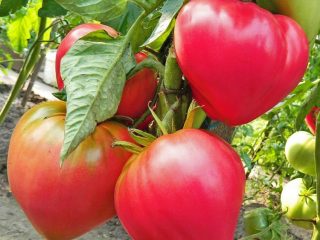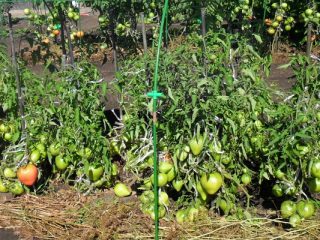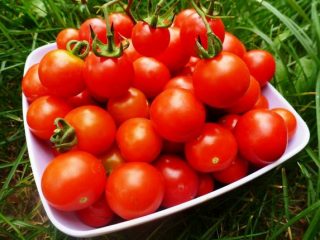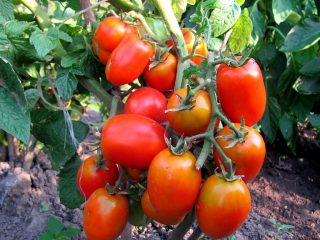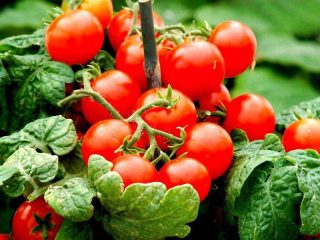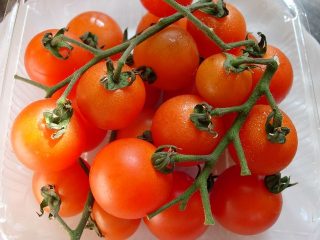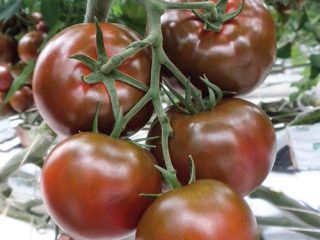Content
Tomato Crazy Empress is a mid-early, large-fruited variety characterized by high productivity and immunity to adverse environmental factors. It is suitable for cultivation on an industrial scale and is suitable for greenhouses, greenhouses and unprotected soil.
Who brought it out and when?
The Crazy Empress tomato is a new and very promising variety bred by Ural breeders. The difficult meteorological conditions of the region provided an excellent background for the selection of exclusive forms. Thanks to this, the tomato variety stands out among its fellow “hearts” from other areas.
Description and characteristics of the Crazy Empress tomato
The plant is an elegant tall bush of indeterminate type. When grown in a greenhouse, its thin, weak stems stretch up to 1.8 m. In open ground conditions, the length of the shoots does not exceed 1 m.The bush is covered with medium-sized green leaves and produces large tomatoes during the fruiting period.

4-5 massive fruits are formed on each brush
Tomatoes of the Crazy Empress variety have a heart-shaped round shape and are covered with raspberry skin, under which lies juicy, aromatic, sugary pulp with a bright tomato aftertaste.
Maturation period
The Crazy Empress tomato is a mid-early variety. It begins to bear fruit 110-115 days after emergence and pleases with ripe tomatoes already in early or mid-July.
Tomato yield Crazy Empress
The variety belongs to the highly productive category. With proper agricultural technology, up to 7 kg of ripe tomatoes are harvested from each bush.
Disease resistance
The Crazy Empress tomato has good immunity and is resistant to some “tomato” diseases. In particular, the variety is immune to verticillium and fusarium.
Growing regions
The variety is recommended for cultivation in different regions of the Russian Federation. The Crazy Empress tomato is successfully grown in the Far Eastern, East Siberian, West Siberian, Middle Volga, Ural, Lower Volga, North Caucasus, Volga-Vyatka, Central, West Siberian and Northern regions of the country.
Purpose and application
Crazy Empress tomatoes have juicy, sweet, grainy flesh. They are consumed raw and used to prepare summer salads, ketchups, sauces and pastes.
Advantages and disadvantages
Tomato Crazy Empress is a new variety of Russian selection with large fruits that have a sweet “tomato” taste.It belongs to the salad variety and is suitable for growing in open and protected ground.

The high yield of the variety is due to short internodes, the number of productive flower clusters and good setting
Pros:
- thin-skinned;
- pleasant taste;
- high productivity;
- resistance to diseases.
Minuses:
- unsuitable for long-term storage;
- requirement for watering.
Planting seedlings and planting in the ground
Start sowing tomato seeds for seedlings 60 days before transferring them to a permanent place. The optimal time for sowing is the second ten days of March when planting in a greenhouse and the first ten days of April when growing in unprotected soil. Dry Crazy Empress tomato seeds are distributed in an even layer in a container filled with a mixture of equal amounts of turf soil, humus and peat. The crops are moistened abundantly with warm, settled water sprayed from a spray bottle and covered with glass or transparent film to ensure a greenhouse effect.
After approximately 5-7 days, when the first shoots hatch, the box with tomato seedlings is freed from the shelter and placed on the windowsill. The substrate under the sprouts is regularly moistened, carefully loosened and fertilized.
At the stage of the first true leaf, tomato seedlings are planted in individual 8x8 cm cups. If the moment is missed, transfer to separate containers is carried out at the stage of appearance of 3-4 leaves.
Important! At the stage of two true leaves, the first flower cluster is laid, and if picked at this time, the first tomatoes will be “clumsy”.
Before transferring to a permanent place, the seedlings are fed twice with complex fertilizer Rich Bed at the rate of 5 g/l of water. Apply 50 ml of the prepared solution to each plant.To minimize the stress load, tomato seedlings are hardened off, gradually adapting them to the environment.

24 hours before transplanting tomato seedlings into the beds, spray them with Epin.
Plants ready for planting have a well-developed root system, 5-6 true leaves and buds.
Further care
Although the Crazy Empress tomato is considered an unpretentious litter, it requires proper care, which involves basic agrotechnical manipulations:
- Regular watering. The soil under the tomato bushes is moistened weekly with warm, settled water as the top layer dries. This is done in the morning or evening hours so as not to provoke physiological shock in the plants due to the difference in temperature of the water and the surrounding air. Water the tomatoes strictly at the root at the rate of 10 l/m2 before fruiting and 20 l/m2 after it started.
- Feeding. To increase productivity, in the intensive growth phase, tomatoes are fertilized with phosphate or nitrogen compounds. At the fruiting stage, organic matter is added to the soil under the tomatoes. Starting from the flowering of the first clusters, the tomatoes are sprayed with a solution of boric acid prepared at the rate of 1 tsp. /10 liters of water. Additionally, 2-3 drops of iodine and several crystals of potassium permanganate are added to it.
- Garter, pinching and bush formation. Plants form 1-2 stems with six flower clusters, promptly getting rid of excess shoots, wilted leaves and dried fragments. 2-3 days after transferring the seedlings to a permanent place, they are tied to the trellis with soft twine, wrapping the stem under each internode.At the same time, stepchildren are removed - shoots growing from the axils of the leaves. When formed into two stems, productivity is higher. But the average weight of tomatoes in this case decreases. The second shoot is formed from a stepson located under the first flower cluster. Each stem is tied separately. The lower plates are thinned out. They are picked off gradually, 1-2 pieces per week, so as not to cause cracking of the tomatoes. Leaves are removed until all specimens growing below the first fruit cluster are removed. There should always be 15-16 well-developed plates on the plant. Their excessive removal accelerates fruit ripening to the detriment of yield.
- Weeding and loosening the soil. 24-48 hours after each moistening, the soil in the beds with tomatoes is loosened to ensure air flow to the roots and prevent stagnation of water, which provokes the development of fungal infections. At the same time, weeds are plucked in the tree trunk circle.
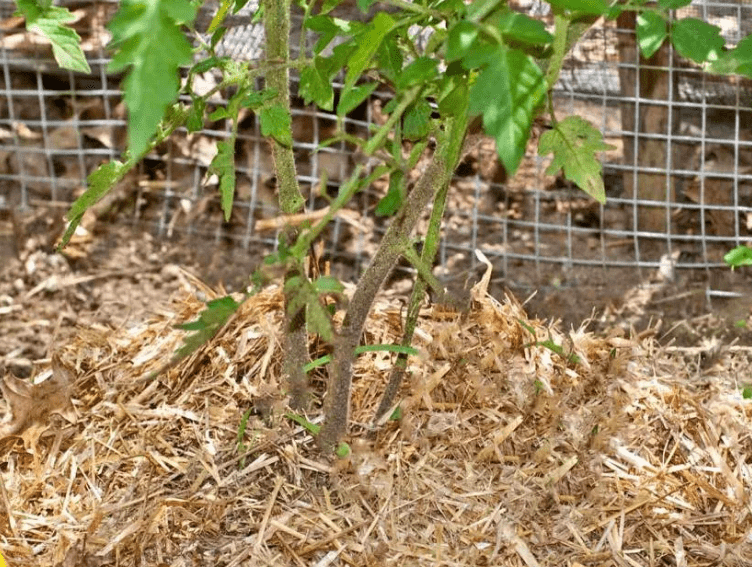
To weed the beds less often, the bushes are mulched with slightly dried cut grass in a layer of 5-7 cm
Treatment against diseases and pests
Although the Crazy Empress tomato is resistant to major tomato diseases, in cold rainy weather it is easily affected by late blight. It progresses very quickly and covers all parts of the plant, including fruits. For the prevention and treatment of late blight, fungicides are used, for example, Magnicur Fino, Healer, Ridomil Gold, etc.

The causative agent of late blight is Phytophthora infestans
Conclusion
The Crazy Empress tomato is a mid-season salad variety characterized by resistance to adverse environmental factors. It is suitable for cultivation in regions with a temperate climate and consistently produces rich yields.
Reviews from gardeners about the Crazy Empress tomato variety
